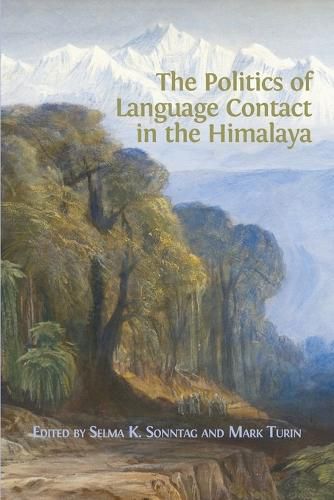Readings Newsletter
Become a Readings Member to make your shopping experience even easier.
Sign in or sign up for free!
You’re not far away from qualifying for FREE standard shipping within Australia
You’ve qualified for FREE standard shipping within Australia
The cart is loading…






This title is printed to order. This book may have been self-published. If so, we cannot guarantee the quality of the content. In the main most books will have gone through the editing process however some may not. We therefore suggest that you be aware of this before ordering this book. If in doubt check either the author or publisher’s details as we are unable to accept any returns unless they are faulty. Please contact us if you have any questions.
This highly original and timely collection brings together case studies from salient areas of the Himalayan region to explore the politics of language contact. Promoting a linguistically and historically grounded perspective, The Politics of Language Contact in the Himalaya offers nuanced insights into language and its relation to power in this geopolitically complex region.
Edited by respected scholars in the field, the collection comprises five new research contributions by established and early-career researchers who have been significantly engaged in the Himalayan region. Grounded in a commitment to theoretically informed area studies, and covering Tibet (China), Assam (India), and Nepal, each case study is situated within contemporary debates in sociolinguistics, political science, and language policy and planning. Bridging disciplines and transcending nation-states, the volume offers a unique contribution to the study of language contact and its political implications.
The Politics of Language Contact in the Himalaya is essential reading for researchers in the fields of language policy and planning, applied linguistics, and language and literary education. The detailed introduction and concluding commentary make the collection accessible to all social scientists concerned with questions of language, and the volume as a whole will be of interest to scholars in anthropology, sociolinguistics, political science and Asian studies.
$9.00 standard shipping within Australia
FREE standard shipping within Australia for orders over $100.00
Express & International shipping calculated at checkout
This title is printed to order. This book may have been self-published. If so, we cannot guarantee the quality of the content. In the main most books will have gone through the editing process however some may not. We therefore suggest that you be aware of this before ordering this book. If in doubt check either the author or publisher’s details as we are unable to accept any returns unless they are faulty. Please contact us if you have any questions.
This highly original and timely collection brings together case studies from salient areas of the Himalayan region to explore the politics of language contact. Promoting a linguistically and historically grounded perspective, The Politics of Language Contact in the Himalaya offers nuanced insights into language and its relation to power in this geopolitically complex region.
Edited by respected scholars in the field, the collection comprises five new research contributions by established and early-career researchers who have been significantly engaged in the Himalayan region. Grounded in a commitment to theoretically informed area studies, and covering Tibet (China), Assam (India), and Nepal, each case study is situated within contemporary debates in sociolinguistics, political science, and language policy and planning. Bridging disciplines and transcending nation-states, the volume offers a unique contribution to the study of language contact and its political implications.
The Politics of Language Contact in the Himalaya is essential reading for researchers in the fields of language policy and planning, applied linguistics, and language and literary education. The detailed introduction and concluding commentary make the collection accessible to all social scientists concerned with questions of language, and the volume as a whole will be of interest to scholars in anthropology, sociolinguistics, political science and Asian studies.